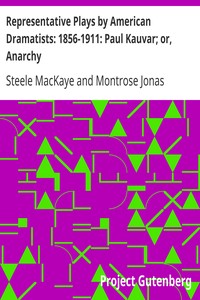Representative Plays by American Dramatists: 1856-1911: Paul Kauvar; or,…
"Paul Kauvar; or, Anarchy" by Steele Mackaye is a historical play written during the late 19th century. Set during the Reign of Terror in revolutionary France, the drama explores themes of liberty, justice, and the consequences of anarchy through the life of Paul Kauvar, a passionate revolutionary caught between his ideals and the chaos that ensues. The play delves into the complexities of loyalty and love, especially in the turbulent relationship between
Paul and Diane de Beaumont, as well as his struggle against the darker forces of the revolution. At the start of the play, we witness the oppressive atmosphere of revolutionary Paris, where fear and suspicion reign supreme. Through the light-hearted banter between Nanette and Potin, we learn about the dangers of speaking out against the government. The tension heightens when Diane, the daughter of the Duc de Beaumont, expresses her concerns for her father's safety, highlighting her deep fears about the political climate. Meanwhile, Paul Kauvar’s sense of duty to protect her and his country from the horrors of anarchy is established. This opening portion effectively sets the stage for the conflict between personal love and political loyalty, hinting at the tragedies that will unfold due to the caprices of fate and ambition in the midst of society's upheaval. (This is an automatically generated summary.)
Read or download for free
| How to read | Url | Size | |||
|---|---|---|---|---|---|
| Read now! | https://www.gutenberg.org/ebooks/13006.html.images | 257 kB | |||
| EPUB3 (E-readers incl. Send-to-Kindle) | https://www.gutenberg.org/ebooks/13006.epub3.images | 210 kB | |||
| EPUB (older E-readers) | https://www.gutenberg.org/ebooks/13006.epub.images | 206 kB | |||
| EPUB (no images, older E-readers) | https://www.gutenberg.org/ebooks/13006.epub.noimages | 151 kB | |||
| Kindle | https://www.gutenberg.org/ebooks/13006.kf8.images | 522 kB | |||
| older Kindles | https://www.gutenberg.org/ebooks/13006.kindle.images | 488 kB | |||
| Plain Text UTF-8 | https://www.gutenberg.org/ebooks/13006.txt.utf-8 | 160 kB | |||
| Download HTML (zip) | https://www.gutenberg.org/cache/epub/13006/pg13006-h.zip | 191 kB | |||
| There may be more files related to this item. | |||||
Similar Books
About this eBook
| Author | MacKaye, Steele, 1842-1894 |
|---|---|
| Editor | Moses, Montrose Jonas, 1878-1934 |
| Title | Representative Plays by American Dramatists: 1856-1911: Paul Kauvar; or, Anarchy |
| Credits | Produced by David Starner, Leah Moser and the Online Distributed Proofreading Team |
| Reading Level | Reading ease score: 87.2 (6th grade). Easy to read. |
| Language | English |
| LoC Class | PS: Language and Literatures: American and Canadian literature |
| Subject | American drama |
| Category | Text |
| EBook-No. | 13006 |
| Release Date | Jul 23, 2004 |
| Most Recently Updated | Oct 28, 2024 |
| Copyright Status | Public domain in the USA. |
| Downloads | 99 downloads in the last 30 days. |
| Project Gutenberg eBooks are always free! | |

